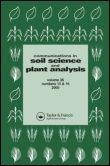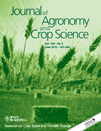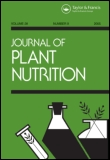
Gesunde Pflanzen
metrics 2024
Fostering Sustainable Practices for Healthy Plants
Introduction
Gesunde Pflanzen is a prestigious peer-reviewed journal published by Springer, based in Germany. Specializing in the fields of agricultural and biological sciences, this journal has established itself as an essential resource for researchers, professionals, and students interested in plant health and pathology. With an impressive impact factor in the Q2 category, ranking 73 out of 221 within the general agricultural and biological sciences field (67th percentile as of 2023), Gesunde Pflanzen offers invaluable insights into current trends, challenges, and breakthroughs in plant research. The journal has been consistently publishing academic contributions since its inception in 1974, fostering advancements in agricultural practices and promoting sustainable plant health management strategies. While the journal does not currently offer open access options, its rigorous peer-review process ensures that published articles maintain high standards of scientific integrity and relevance. Researchers and professionals in the field are encouraged to engage with this journal to stay abreast of the latest findings and methodologies shaping the future of agriculture.
Metrics 2024
 0.50
0.50 2.40
2.40 2.40
2.40 27
27Metrics History
Rank 2024
Scopus
IF (Web Of Science)
JCI (Web Of Science)
Quartile History
Similar Journals

Turkish Journal of Field Crops
Bridging Theory and Practice in Field CropsTurkish Journal of Field Crops is a prestigious peer-reviewed publication dedicated to advancing the field of agronomy and crop science, published by the Society of Field Crop Science. With an ISSN of 1301-1111, this journal serves as a crucial platform for researchers and professionals to disseminate innovative findings and discuss practical applications in crop cultivation and management. Hailing from Turkey, it aims to address the pressing challenges facing agriculture in both regional and global contexts, particularly over its converged years from 2009 to 2024. As a Q3 ranked journal in the Agronomy and Crop Science category with a Scopus ranking of #259/406 and a percentile of 36th, it fosters high-quality research that contributes to the sustainable development of field crops. Though it operates under various access options, this journal is committed to providing valuable insights into agronomic practices, aiming to bridge the gap between theory and application for scientists, educators, and practitioners alike.

COMMUNICATIONS IN SOIL SCIENCE AND PLANT ANALYSIS
Fostering Dialogue on Agricultural Innovation and StewardshipCOMMUNICATIONS IN SOIL SCIENCE AND PLANT ANALYSIS, published by Taylor & Francis Inc, is a prestigious journal dedicated to advancing research in the fields of agronomy, crop science, and soil science. Established in 1970, the journal has maintained a significant presence over the years, with a commitment to publishing high-quality, peer-reviewed articles that contribute to the understanding of soil and plant interactions. With an impressive Q2 ranking in both Agronomy and Soil Science, it positions itself as a vital resource for researchers, professionals, and students alike, keen on exploring innovative solutions to contemporary agricultural challenges. Although it currently does not provide open access, the journal ensures wide dissemination through its established subscription services. The journal's focus on empirical research, methodologies, and technological advancements in soil management and plant nutrition makes it an essential platform for disseminating knowledge and fostering discussions within the scientific community. Located in the heart of Philadelphia, USA, it remains a significant contributor to the global dialogue on sustainable agriculture and environmental stewardship.

PLANT SOIL AND ENVIRONMENT
Fostering Global Dialogue on Soil and Environmental Science.PLANT SOIL AND ENVIRONMENT is a premier open-access journal dedicated to the interdisciplinary study of soil science, agronomy, and environmental interactions, published by the Czech Academy Agricultural Sciences. With an ISSN of 1214-1178 and E-ISSN 1805-9368, this journal has been a vital platform for dissemination of research since its inception in 2002. Based in the Czech Republic, it has garnered a robust reputation within its field, as indicated by its impressive Q2 ranking in Soil Science and ranking #47 out of 159 in the Scopus Ranks for Agricultural and Biological Sciences, placing it in the 70th percentile overall. The journal explores diverse topics within soils and their significant roles in plant health, ecosystem services, and sustainable agricultural practices, contributing important insights that benefit researchers, practitioners, and policy-makers alike. Aiming for a global outreach, PLANT SOIL AND ENVIRONMENT not only facilitates open dialogue among scientists but also ensures that cutting-edge research is freely accessible to enhance the knowledge base in soil science.

Revista Caatinga
Cultivating Knowledge, Harvesting ProgressRevista Caatinga is a premier open-access journal published by Universidade Federal Rural do Semi-Árido (UFERSA), dedicated to the dissemination of significant research within the field of Agricultural and Biological Sciences. Since its inception in 2006, the journal has aimed to bridge the knowledge gap in various aspects of agricultural practices and biological phenomena, making vital contributions to the scientific community. With its publications indexed in Scopus and holding an impressive Q2 categorization in the competitive landscape of agricultural sciences, the journal ranks within the top half of its category (100/221), demonstrating a commitment to quality scholarship. The journal is based in Brazil and covers a wide array of topics relevant to both local and global agricultural challenges. By fostering open access, Revista Caatinga ensures that vital research is available to a broad audience, promoting knowledge sharing and collaboration among researchers, practitioners, and students around the world.

JOURNAL OF AGRONOMY AND CROP SCIENCE
Driving excellence in agronomy and crop science research.JOURNAL OF AGRONOMY AND CROP SCIENCE, published by Wiley, stands as a leading platform in the fields of agronomy and crop science, reflecting its commitment to advancing knowledge through rigorous research. With an impressive H-index that signifies its scholarly impact, this journal has consistently maintained a prestigious Q1 ranking in both Agronomy and Crop Science, and Plant Science as of 2023. With a robust ranking of #46/516 in Plant Science and #39/406 in Agronomy and Crop Science according to Scopus, it sits comfortably within the top percentiles, emphasizing its relevance and authority in the academic community. The journal has been a vital resource since its inception in 1973, with ongoing coverage until 2024, making it an essential reference for researchers, professionals, and students looking to navigate the latest developments and insights in crop management and agricultural practices. Although it does not currently offer open access options, JOURNAL OF AGRONOMY AND CROP SCIENCE remains committed to providing high-quality, peer-reviewed content that fosters innovation and encourages sustainable solutions within the agronomy sector.

REVISTA DE LA FACULTAD DE CIENCIAS AGRARIAS
Advancing Sustainable Agriculture through Innovative Research.REVISTA DE LA FACULTAD DE CIENCIAS AGRARIAS is an esteemed academic journal published by UNIV NACIONAL CUYO, FAC CIENCIAS AGRARIAS, located in Chacras de Coria, Mendoza, Argentina. As a pivotal publication in the fields of Agronomy and Plant Science, it has achieved a commendable Q2 ranking in both categories, indicating its relevance and impact within the scientific community. Since its establishment as an Open Access journal in 2007, it has facilitated the dissemination of crucial research, fostering collaboration and innovation among researchers, professionals, and students alike. The journal's converged years from 2008 to 2024 allow it to present contemporary advancements and discussions related to agricultural practices and plant sciences. With a strong commitment to quality and accessibility, REVISTA DE LA FACULTAD DE CIENCIAS AGRARIAS provides a valuable platform for those engaged in the crucial exploration of sustainable agricultural methodologies and plant innovations.

Plant Stress
Exploring the Resilience of Flora Under StressPlant Stress is a prestigious academic journal published by Elsevier that focuses on the critical study of stress responses in plants, bridging vital areas such as ecology, evolution, and plant science. With its ISSN 2667-064X, this journal serves as an essential platform for researchers and professionals seeking to explore innovative findings and advancements in plant stress biology. Its notable rankings in the Q1 category for both Ecology, Evolution, Behavior, and Systematics and Plant Science as of 2023 further establish its significance, being recognized in the top quartile of its field. The journal’s impressive Scopus ranks, including Rank #144/721 and Rank #107/516 in the respective categories, highlight its influence and the quality of research it disseminates. While currently not offering Open Access, Plant Stress is instrumental in fostering academic dialogue and collaboration among researchers worldwide, with implications that extend beyond theoretical studies into practical applications in agriculture and environmental management. For those dedicated to understanding plant resilience and stress adaptation, Plant Stress is an indispensable resource.

MAYDICA
Nurturing innovation in plant sciences for a sustainable future.MAYDICA is an esteemed scholarly journal dedicated to advancing knowledge in the fields of Agronomy, Crop Science, Genetics, and Plant Science, with a commitment to disseminating high-quality research that influences practices and policies in agriculture and crop management. Published by MAYDICA-IST SPER CEREALICOLTUR and based in Italy, the journal has been a pivotal resource for researchers since its inception in 1993. The journal is currently ranked in the Q3 category for Agronomy and Crop Science and Q4 for both Genetics and Plant Science, reflecting its growing impact within the academic community. Although it operates without open access, its rigorous peer-review process ensures the integrity and relevance of the research it publishes. MAYDICA seeks to foster collaboration among scientists, practitioners, and students, encouraging the exchange of innovative ideas and methodologies that address contemporary challenges in agricultural sciences. With a focus on timely research and developments, MAYDICA is an essential platform for those looking to enhance their understanding and application of agricultural advancements.

Legume Research
Nurturing Research for Food Security and Ecological BalanceLegume Research, published by the AGRICULTURAL RESEARCH COMMUNICATION CENTRE in India, is an essential peer-reviewed journal focusing on advancements in the field of agronomy, crop science, soil science, and plant science. With an ISSN of 0250-5371 and operating since 2008, this journal caters to researchers, agricultural professionals, and students interested in the critical role of legumes in sustainable agriculture and food security. It ranks within the third quartile (Q3) in several prominent categories, reflecting its contribution to the agricultural and biological sciences community—ranking #279 in Agronomy and Crop Science, #113 in Soil Science, and #376 in Plant Science based on Scopus metrics. Although not open access, Legume Research remains a vital resource for those seeking to enhance their knowledge and contribute novel research findings in the ever-evolving discipline of legume cultivation and utilization. With a clear objective to disseminate impactful research, this journal significantly contributes to the global understanding of legumes' ecological, economic, and nutritional importance.

JOURNAL OF PLANT NUTRITION
Exploring Nutrient Dynamics for Enhanced Crop ProductivityJOURNAL OF PLANT NUTRITION, published by Taylor & Francis Inc, is an esteemed peer-reviewed journal dedicated to advancing the field of plant nutrition and agronomy. With an ISSN of 0190-4167 and an E-ISSN of 1532-4087, this journal has been at the forefront of research since its inception in 1979 and continues to provide critical insights through 2024 and beyond. It is recognized for its rigorous scholarship, ranking Q2 in Agronomy and Crop Science and Q3 in Physiology as of 2023, highlighting its significance in both the agricultural and biological sciences. The journal's Scopus ranks further reinforce its impact, placing it in the 71st percentile for Agronomy and Crop Science and the 42nd percentile for Physiology. Researchers, professionals, and students alike benefit from its comprehensive coverage of topics, fostering a greater understanding of plant nutrient dynamics and their implications for sustainable agriculture. While the journal is not open access, it remains a vital resource for those dedicated to advancing agricultural practices and enhancing crop productivity in an era of global food challenges.